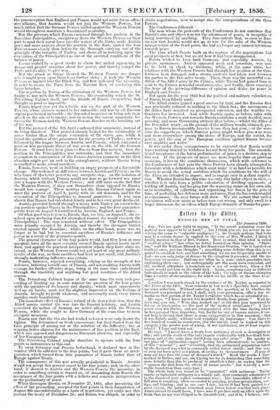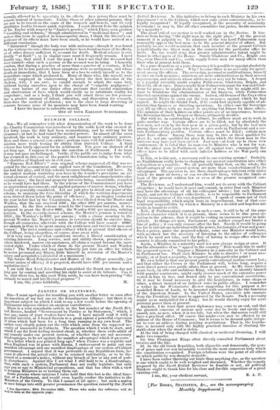Trittrs to t4t Muth . .
MEDICAL MEN AT FAULT. .
234 January 1856. Sin—You are quite right in saying, "In the recent poisoning cases the medical men appear to be at fault' .; but I think you are too severe in as- cribing the cause to "culpable negligence " ; for though perhaps that term May to a certain degree be applied to the ease of Mrs. Wooler, I think it hardly merited in that of Mrs. Palmer. Bear in mind, that what is called "medical science" has often no better foundation than opinion. "Opin- ion," said Sir William Blizard in his Hunterian Oration, "belt founded on truth or error, governs thoughts" ; something more definite than this is re- quired to establish fact, and that something we are too frequently unable to find—we can only judge of disease by the symptom it presents, and the in- formation we receive. Patients are often in a state which precludes their explaining their ease; not unfrequently are the main facts concealed, and the medical attendant is launched on a sea of conjecture, when a few words would put him on the right tack. Again, symptoms vary in different individuals as much as the colour of the hair ; the type of disease changing from a variety of circumstances for which we are unable at the time to ac- count.
I confess I was much struck by the evidence of Dr. Taylor, as reported in the Times of the 14th. -Your remarks in last week's Spectator have caused me some reflection. Without entering on the question as to whether the deceased was poisoned or not, I shall, with your permission, offer a few re- marks on that portion of Dr. Taylor's evidence which has so astounded me. Ile says, "I have known five hundred deaths from poison." Well in- deed may you ask, "Were they hushed up? or did they pass unnoticed by favour or inattention on the part of the medical attendants ? " I have never seen the Doctor, and am unacquainted with the time during which he has pursued these inquiries; but, for the horour of human nature, I can not help believing that there is some exaggeration in this assertion,—that it was lightly made, without well weighing its importance. Can there be five hundred would-be murderers, (for the suicide must be ranked in this category,) the greater part of whom, if not undetected, are at least unpun- ished? I hope and trust not. He says, "I never knew a death from antimony of such a description as this ; and yet the death of this lady is quite conformable with her death from poison, and at the same time death from any other cause." Ile speaks in one place of " antimonial copper" 'having been administered ; in another, of this "mineral" ; and " seventhly, that the antimonial preparation takeu by the deceased was what is commonly called tartar emetic : and this maY or may not have acted as a poison, tfecortling; to eiroumstances. It may or may not have been the cause of deceased's death." Read the words I have marked in Italics, and say, am I going too far in demanding that something snore 'definite than this be produced to establish a fact—in saying that the "opinion she died from the effects of tartar emetic" has scarcely a more stable foundation than conjecture ? The whole body was found to be "saturated" with antimony. Tartar emetic or tartarized antimony is a Bauble salt, most commonly administered in the dissolved state called antimonial wine. The inunediate effects of a full dose is vomiting, often succeeded by purging, profuse perspiration, ver- tigo and fainting; and in one case I saw, where it had been pushed to a great extent, the patient remained some hours before reaction took place. Administered in small doses, I have seen it produce such an effect upon the brain that its use was obliged to be discontinued; and it is, I believe, mu- venially allowed to be uncertain in its effects. As a poison these must be instead nstead of immediate. Unlike those of other mineral poisons' they are not to be traced on the coats of the stomach and bowels, and its very attributes lead to ita more quick rejection. I must dissent from the opinion of Hr. Taylor with respect to "James's powder," which I have seen produce "vomiting and sickness," though administered in "medicinal doses " ; and unless this term be applied to homteopathie doses, I think the Doctor's ex- perience of its effects must have been small, or he would have arrived at a aifferent conclusion. "Saturated" though the body was with antimony—though it was found in the various viscera—there appears to have been found no trace of its effects, or of other disease sufficient to account for death. Medical science is evi- dently "at fault" ; so in similar cases must it frequently remain. I need hardly say, that until I read the paper I knew not that the deceased had ever existed—that such a person as the accused was in being. I honestly confess, that during a practice of more than a quarter of a century, it has been my lot to lose patients whose symptoms were so ambiguous, and whose death so immediate, that I have been at a loss to satisfy myself as to the immediate cause which produced it. Many of those who, like myself, were actively employed in endeavouring to arrest the first invasion of the cholera, will, I am sure, be candid enough to admit the same fact, without laying ourselves open to the charge of "culpable negligence." The very nature of our duties often prevents that careful registration and observation of facts which would enable us to substitute reality for conjecture; and as a body, I think you will admit there are few possess- ing a greater amount of talent, education, and disposition for research, than does the medical profession ,• nor is the class at large deserving of censure because some of its members may have been found wanting.
I have the honour to subscribe myself,
ONE OF TOUR EARLIEST SUBSCRIBERS.











































 Previous page
Previous page